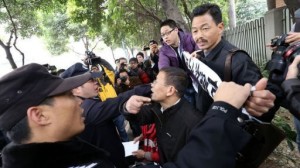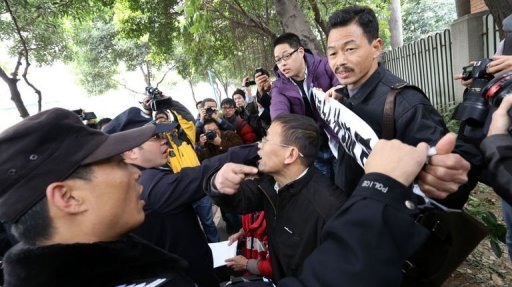
Guangzhou, China (AFP) — A Chinese weekly newspaper at the centre of rare public protests about government censorship will publish as usual on Thursday, a senior reporter said, following reports of a deal to end the row.
“The newspaper will publish as normal on Thursday,” the Southern Weekly staff member, who declined to be named, told AFP after reports said journalists had reached an agreement with the authorities.
The row at the popular liberal paper, which had an article urging greater rights protection replaced with one praising the ruling communist party, has seen demonstrators mass outside its headquarters in the southern city of Guangzhou.
Public challenges to the authorities on press freedom are rare in China and the affair is seen as a test for the new Communist Party leadership under Xi Jinping.
“It was a case of internal politics,” the reporter said. “I am writing an article as we speak, it’s about Alexis de Tocqueville’s The Old Regime and the Revolution,” referring to the French thinker’s analysis of the events of 1789.
The South China Morning Post said Guangdong province’s communist chief Hu Chunhua, a rising star in the party, had stepped in to mediate in the row.
“There’s a verbal agreement in place. Basically it’s back to normal, but we’ll see how the two sides react to each other in the future,” Dow Jones Newswires quoted a Southern Weekly editor as saying.
Under the deal, journalists involved in the protests would not be punished and propaganda authorities would no longer directly interfere in content before publication, Dow Jones said.
The agreement is a “small victory” in a long-running struggle between journalists and censors in China, said David Bandurski, a Chinese media researcher at Hong Kong University.
“It’s a victory in the most concrete terms, it’s a turn back to a normalcy of censorship that journalists have become accustomed to,” he said, adding that the high-profile stand-off could persuade officials not to further tighten controls.
A few protesters gathered outside the Southern Weekly’s offices Wednesday holding banners including one reading “Democratic China”. They had pushing and shoving confrontations with pro-government rivals who played patriotic songs at them.
At their peak Monday the demonstrations drew hundreds of people and the campaign was backed by the blogosphere and celebrities on social media.
Beijing’s propaganda department denied reports that the row was spreading with the resignation of the publisher of the Beijing News, part-owned by the Southern Weekly’s owner, over a directive to reprint a dismissive editorial on the issue.
The commentary, originally in the Global Times, which has links to the ruling party, said an “absolutely free media” was unlikely in the country, adding: “Media reform should be in line with China’s politics.”
Media and online posts said Dai Zigeng told a propaganda official he was quitting after being threatened with the paper’s closure if it did not print the article.
Extracts from it appeared on page 20 in Wednesday’s edition, attributed to the Global Times.
But a Beijing Propaganda Bureau official told AFP: “Mr Dai is still at work as usual.”
In an apparent gesture of defiance, the Beijing News published an article on its website entitled “Southern Porridge”, which sounds like “Southern Weekly” in Mandarin.
“A bubbling hot bowl of porridge from southern soil seems to have a brave heart,” it said.
All media organisations receive instructions from government propaganda departments, which act to suppress news seen as “negative” by the Communist Party. But the censorship of Southern Weekly was seen as unusually direct.
Its original article called on authorities to implement the constitution, which enshrines rights including freedom of speech and assembly.
The paper’s investigative reports made it one of the most circulated in China, with a keen following among urban intellectuals, but also left it subject to periodic purges.
Its editor was demoted in 2009 after the White House gave it an exclusive interview with Barack Obama, while authorities ordered Southern Weekly’s former news director Zhang Ping to resign in 2011.
China came 174th in a list of 179 countries ranked for press freedom in 2011-12 by advocacy group Reporters Without Borders, falling three places compared to the previous year.


